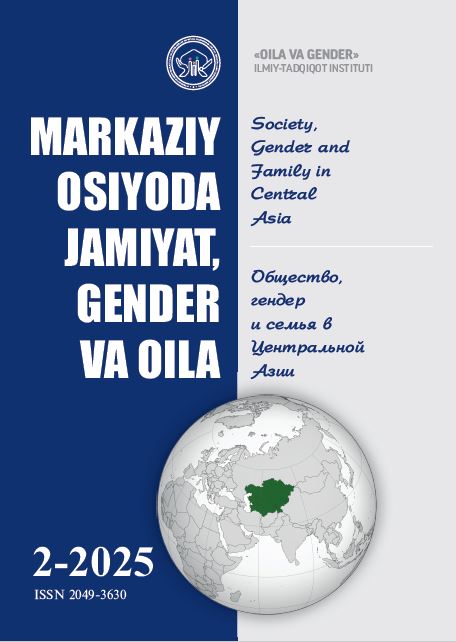Oilalarda o‘smir aqliy qobiliyatining rivojlanishidagi o‘ziga xos xususiyatlarni o‘rganish natijalari
DOI:
https://doi.org/10.65185/mojgo.vi.241Annotasiya
Ushbu maqolada o‘zbek kontekstida o‘smirlarning intellektual rivojlanishiga ta’sir ko‘rsatuvchi oila bilan bog‘liq omillarning xilma-xilligi o‘rganilgan ishlar mazmuni yoritilgan. Mahalliy va xalqaro tadqiqotlarga asoslanib, u oila tuzilishi, ota-onalarning tarbiya uslublari, ijtimoiy-iqtisodiy holat va bilim olish natijalarini shakllantirishda ota-onalarning ishtiroki kabi omillarni tahlil qiladi. Tadqiqot natijalari o‘smirlarning aqliy o‘sishini rag‘batlantirishda qo‘llab-quvvatlovchi oilaviy muhitning ahamiyatini ta’kidlaydi.
Kalit so‘zlar:
oila tuzilishi o‘smirlarning rivojlanishiBibliografik manbalar
Bates T. C., Lewis G. J., & Weiss A. (2013). Childhood socioeconomic status amplifies genetic effects on adult intelligence. Psychological Science, 24(10). pp. 2111-2116. https://doi.org/10.1177/0956797613488394
Baumrind D. (1991). The influence of parenting style on adolescent competence and substance use. The Journal of Early Adolescence, 11(1). pp. 56-95. https://doi.org/10.1177/0272431691111004
Bialystok E. (2011). Reshaping the mind: The benefits of bilingualism. Canadian Journal of Experimental Psychology, 65(4). pp. 229-235. https://doi.org/10.1037/a0025406
Bronfenbrenner U., & Morris P. A. (2006). The bioecological model of human development. In R. M. Lerner & W. Damon (Eds.), Handbook of child psychology: Theoretical models of human development (Vol. 1, 6th ed.. pp 793-828). John Wiley & Sons Inc.
Bruner J. (1991). The narrative construction of reality. Critical Inquiry, 18(1), 1–21.
Falbo T., & Polit D. F. (1986). Quantitative review of the only child literature: Research evidence and theory development. Psychological Bulletin, 100(2). pp. 176-189. https://doi.org/10.1037/0033-2909.100.2.176
Gentry M., & Benington J. (2021). The role of grandparents in the socialization of grandchildren: A crosscultural analysis. Journal of Intergenerational Relationships, 19(2). pp. 143-165.
Grolnick W. S., & Ryan, R. M. (1989). Parent styles associated with children’s self-regulation and competence in school. Journal of Educational Psychology, 81(2). pp. 143-154. https://doi.org/10.1037/0022-0663.81.2.143
Jeynes W. H. (2007). The relationship between parental involvement and urban secondary school student academic achievement: A meta-analysis. Urban Education, 42(1). pp. 82-110. https://doi.org/10.1177/0042085906293818
King P. E., & Boyatzis, C. J. (2004). Exploring adolescent spiritual and religious development. In R. M. Lerner & L. Steinberg (Eds.), Handbook of adolescent psychology (2nd ed., – P. 529-556). John Wiley & Sons.
Masten A. S. (2014). Global perspectives on resilience in children and youth. Child Development, 85(1).pp. 6-20. https://doi.org/10.1111/cdev.12205
Rideout V., & Robb M. B. (2019). The Common Sense census: Media use by tweens and teens 2019. Common Sense Media. https://www.commonsensemedia.org/research/the-common-sense-census-mediause-by-tweens-and-teens-2019
Turakulova A., Khabibov T., & Sharafutdinova Z. (2022). The question of fathers: Features of raising adolescents in complete and incomplete families in Tashkent (Uzbekistan). Social Sciences. pp. 1-15. https://doi.org/10.1080/03623319.2022.2154447
Turkheimer E., Haley A., Waldron M., D’Onofrio B., & Gottesman I. I. (2003). Socioeconomic status modifies heritability of IQ in young children. Psychological Science, 14(6). pp. 623-628. https://doi.org/10.1046/j.1467-9280.2003.01475.x
UNICEF Uzbekistan. (2020). Youth study shows access to education & employability as key concerns for young people in Uzbekistan. https://www.unicef.org/uzbekistan/en/youth-report-pr
Yuklashlar
Nashr qilingan
Qanday qilib iqtibos keltirish kerak
Litsenziya
Mualliflik huquqi (c) 2025 Ummatkulova Nigora Umarqulovna

Ushbu ish Creative Commons Attribution 4.0 Worldwide.










